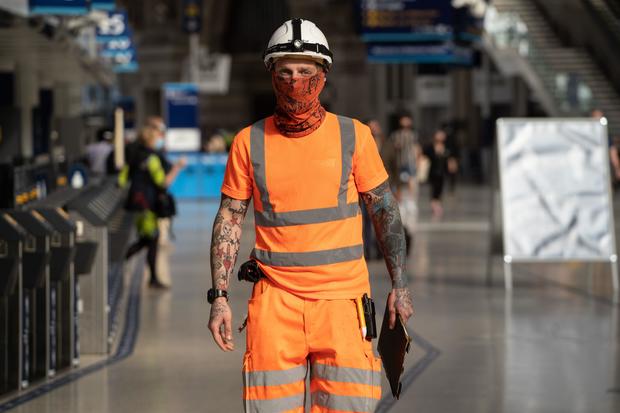Using thin, stretchy neck gaiters as a face covering might be ineffective at stopping the spread of the coronavirus, and could even spread the virus further than not wearing a covering at all, according to a new study. Researchers from Duke University found that the neck gaiter they tested was “worse than nothing.”
“The neck gaiter that we tested did essentially nothing, and worse than nothing, because it appeared to make large droplets into small droplets,” Isaac Henrion, the study’s co-author, told CBS News. Henrion is also the coordinator of Cover Durham, a community project to distribute tens of thousands of masks to vulnerable people.
The experiment involved only a small number of speakers and face coverings, and the researchers stressed that more testing is needed — some gaiters might work better than others, depending on how they’re made.
The neck gaiter is a circular piece of fabric that sits around a person’s neck and can be pulled up to cover their mouth and nose. The issue with the convenient cover-up is likely not with its design, but with the fabric it is typically made from.
According to Henrion, the study tested a neck gaiter made of a thin, stretchy polyester, which is a commonly sold style. Instead of stopping droplets that can contain the virus from escaping into the air, the fabric appeared to turn large droplets into smaller ones known as aerosols.



Niklas Halle’n / Getty
Aerosols are microscopic droplets that are produced when people cough, sneeze or talk, but they do not fall to the ground in the same way larger, visible droplets do. Henrion described an aerosol’s path like that of a paper airplane flying through the air and getting caught on currents that are invisible to the naked eye.
“They’re really tiny, they’re really invisible, they’re buoyant, they don’t fall to the ground, gravity doesn’t act on them,” Kimberly Prather, distinguished chair in atmospheric chemistry at UC San Diego and an expert on aerosols, told CBS News chief medical correspondent Dr. Jonathan LaPook in June.
“And so when (aerosols are) released by someone who’s infected, doesn’t know it, and is talking in a room, they can just build up in a room over time and whoever’s in that room can inhale those and become infected,” according to Prather.
The danger of creating aerosol droplets is that it’s harder to protect ourselves from aerosols than from larger droplets.
“If you inhale tiny aerosols, those go deep into your lungs and can bypass your immune system … that’s why you don’t have symptoms [at first],” Prather explained. “The virus just takes off and your body is under attack, and you don’t know it for five days until it grows up in your upper respiratory tract, then it triggers your immune system, and then you have symptoms.”
“Aerosols are increasingly considered to be a major source of transmission, especially in unventilated and crowded spaces where a strong concentration can build up over time,” according to Henrion. The extent to which aerosols may carry the coronavirus is still being researched, but evidence suggests they play a role.
Study: Multi-layer face masks work better
02:09
Duke’s study focused on droplet production while talking, as opposed to coughing or sneezing, because research has shown that more than half the people infected with COVID-19 do not have symptoms, and therefore are generally not coughing or sneezing, according to Henrion.
“Talking really is the way that asymptomatic transmission happens,” he said.
Dr. Neeta Ogden told CBSN on Wednesday that numerous coronavirus outbreaks, including those among passengers on the Diamond Princess cruise ship, in Boston’s homeless population and the workers at a Tyson poultry factory, happened when “there was a high level of infection and a great percentage of people who were asymptomatic.”
Global coronavirus infections have doubled in just six weeks and climbed past 20 million, according to data from Johns Hopkins University. More than half of those positive cases come from just three countries: the United States, Brazil and India. Since the first cases were detected in the U.S. in January, more than 5 million Americans have been diagnosed and more than 165,000 have died.
Henrion noted that countries where a large percentage of the population wears masks were able to stop community transmission.
“The evidence now from many fields is overwhelmingly that masks work,” he said.
While the study did not set out to create a definitive ranking of masks, Henrion said that N95 and standard surgical masks released the least amount of droplets. N95s yielded the best results, and surgical masks came in second, stopping 90-95% of droplets. Simple two-layer cotton masks were effective at stopping 80% of droplets from getting out when participants spoke.
As for neck gaiters, Henrion stressed that the study was preliminary, and did not conclusively determine whether a gaiter’s fabric or construction was responsible for producing smaller droplets. A neck gaiter with two layers of cotton could be more effective.
Without easy access to PPE, many people have turned to making their own masks. The study showed that homemade versions can be effective, but people should be mindful of their mask construction and fit.
“Further research is needed to investigate the performance of bandanas and neck gaiters, since our study is only a proof of concept for the experimental method,” Henrion said.
Martin Fischer, an associate research professor in Duke’s chemistry department who took part in the study, told WRAL-TV it wasn’t meant to rate different face coverings, adding that “Not all … neck gaiters are bad. There are plenty good ones out there. It depends so much on the material, on how many layers you wear.”

